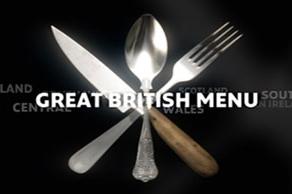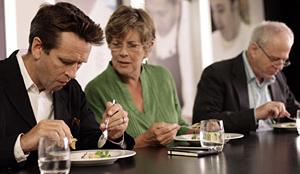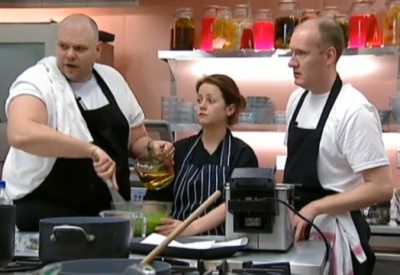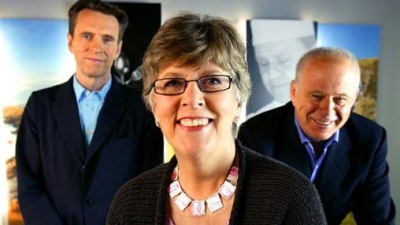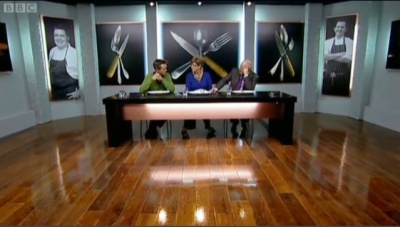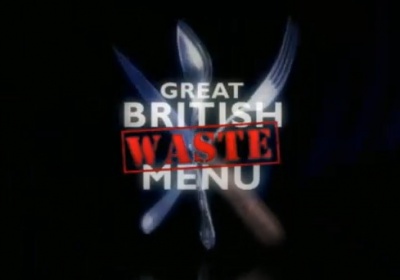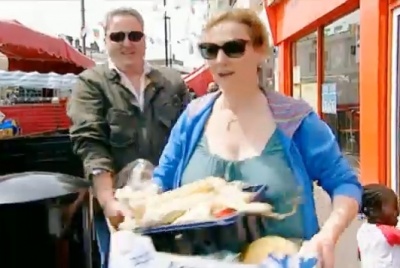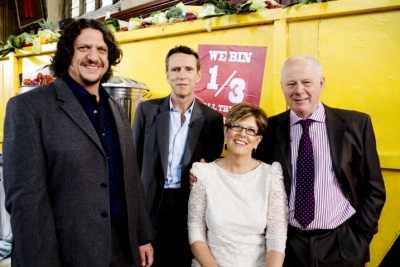Great British Menu
Contents |
Host
Jennie Bond (2006-7)
Susan Calman (2020-)
Voiceover:
Jennie Bond (2008-10)
Mark Bazeley (Great British Waste Menu)
Wendy Lloyd (2011-9)
Co-hosts
Judges:
Matthew Fort
Oliver Peyton
Prue Leith (2006-16)
Andi Oliver (2017-)
Jay Rayner (Great British Waste Menu)
Mary Berry (Great British Budget Menu)
Broadcast
Optomen for BBC Two, 10 April 2006 to present
as Great British Waste/Budget Menu: Optomen for BBC One, 25 August 2010 and 11 July 2013
Synopsis
Fourteen top chefs compete for the honour of cooking for an illustrious banquet (notably for the Queen's 80th birthday bash in the first series). There are seven regional heats between two chefs, each of which unfolds over five weekday programmes. From Monday to Thursday, the chefs prepare and refine one course each day (starters, fish, mains and desserts) and on Friday, both chefs present their full menu to the judges who choose which will progress to the final public vote. The two chefs in each heat work on opposite sides of the same kitchen, giving them the opportunity to engage in crosstalk as they cook, and there are also filmed inserts going into how the chefs come up with their dishes and source their ingredients (some of which must be regional). Much is made in the first round about how the judges are choosing between the two menus as a whole and as such will want to choose dishes that work well together, but when we get to the public vote in the final week, the menus are broken up anyway which seems to defeat the object.
We can't honestly say it floats our boat, particularly since originally the only payoff on Monday to Thursday was the chefs tasting each other's dishes, which was a bit limp. This made these programmes essentially redundant since all the judging was done on Friday. In the fifth series (why'd it take so long?) this was finally addressed by having three chefs competing in each region, with each day's dishes marked out of ten by a previous regional winner. Only the two highest-scoring chefs across the week now get to cook for the judges on Friday.
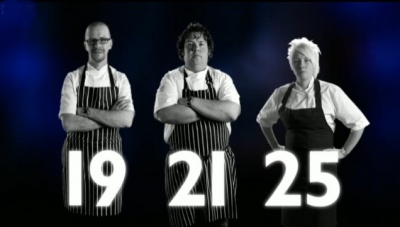 A score graphic from the 2011 North West heat, showing Johnnie Mountain, Bruno Birkbeck and Lisa Allen.
A score graphic from the 2011 North West heat, showing Johnnie Mountain, Bruno Birkbeck and Lisa Allen.The four winning chefs from the first series returned for Great British Christmas Menu in December 2006. For the second series proper, the seven regional winners from series one returned to face new challengers, with the winners cooking a banquet in France to impress their top chefs. Series three added a perfunctory qualifying phase to proceedings, and culminated with a feast in London's Gherkin for top chefs from around the world, presided over by culinary mad scientist Heston Blumenthal (whose name Jennie Bond had to say in every episode, but never did learn to pronounce correctly).
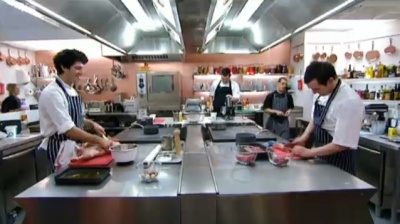 Chefs Henry Herbert, Nathan Outlaw (way off in the distance) and John Hooker hard at work in the GBM kitchen
Chefs Henry Herbert, Nathan Outlaw (way off in the distance) and John Hooker hard at work in the GBM kitchenThe climax of the fourth series - a banquet for troops returning from Afghanistan - was hosted by Ross Kemp, and menus were expected to adhere to the theme "a taste of home". A theme of sorts was also imposed for the fifth series, in which the chefs were each assigned a National Trust property in their region and asked to source as many of the ingredients as possible within what was imprecisely deemed an "ultra-local" distance of that property. Sometimes ingredients could be sourced from the estates themselves, though the main significance was really to get the National Trust mentioned, as they were organising the final banquet.
For 2011, the theme was "food that brings people together" with the chefs having to create sharing platters for a street party. The format is the same as in 2010, except that Jennie Bond is no longer doing the voiceover (it can't have been that great a demand on her time, surely?). 2012 was Olympic-themed, with some vague concept that it was about going further than ever before and the small details that separate winners from losers. It's not entirely clear whether the chefs are still supposed to use ingredients sourced from their own region, but in any case this aspect is no longer given the on-screen emphasis it once was.
 Tom Kerridge (right) celebrates winning his regional heat alongside runner-up Anthony Demetre and home economists Sam Head, Emily Shardlow and Phil Wells
Tom Kerridge (right) celebrates winning his regional heat alongside runner-up Anthony Demetre and home economists Sam Head, Emily Shardlow and Phil Wells2013 saw a Comic Relief theme, with a guest comedian brought in to judge alongside Oliver, Prue and Matthew each week. Each dish receives a mark out of ten from each judge, and (presumably) the chef with the largest total wins. Strangely, the judges are now told which chef has cooked which dish, a change for which there appears to be no good reason at all, though even stranger is the way the opening signature tune no longer actually possesses a tune because they've stuck an old bit of the tension bed over the titles instead. We're sure most viewers don't really care, but it's a bizarre decision.
All in all, it's not the flashiest or most inspiring of food shows, but it's hard to knock a programme that's managed to come back year after year and evidently still finds an audience.
Great British Waste Menu
Given its emphasis on sourcing food as well as cooking it, Great British Menu was an obvious format to be pressed into service for a one-off BBC One programme with a social action theme. In a 90-minute special (quite blatantly divided into 22-minute acts, the better to be repeated as four half-hour programmes on commercial channels), four chefs - Matt Tebbutt, Simon Rimmer, Angela Hartnett and Richard Corrigan - were challenged to source waste food from market stalls, shops, restaurants and homes across London and make dishes to be judged in the usual way. The chefs then had to source enough waste ingredients to produce sixty portions for the final banquet, at which the judges named one of them (Corrigan, if you really want to know) as "Rubbish Chef of the Year" and awarded him a brand new dustbin.
All of this was meant to demonstrate how much perfectly edible food goes to waste, and attempt to persuade supermarkets, producers, restaurants and the like to donate such food to charity rather than throwing it away. Actor Mark Bazeley replaced Jennie Bond on voiceover (an improvement, we reckon) and the show drew its best ever audience of over five million.
Great British Budget Menu
GBM made another trip over to BBC One for 2013's The Cost of Living season. Richard Corrigan, Angela Hartnett and James Martin visited people on restricted food budgets and each created a healthy meal on whatever that restricted budget was (£1.12 a meal, say). The Great British Menu crossover only really happened in the second half, in which each had to produce a main course for £1 a head, to be judged as usual. The special lacked some of the usual hallmarks of the series, in particular Daniel Pemberton's incidental music and any interaction between the chefs, who were given separate mobile kitchens for the banquet (particularly disappointing given what a good pairing Corrigan and Hartnett made on the previous special), making us wonder why they went for Great British Menu as a vehicle at all, rather than just making a standalone programme. In case you're wondering, the trophy - a wooden spoon, oh how witty - went to Angela Hartnett.
Key moments
Johnnie Mountain walking out of the 2012 competition after Marcus Wareing awarded him just two out of ten for his fish course "re-creation of the sea".
Catchphrases
"BUT!" - Richard Corrigan in particular likes big "BUT!s" and he cannot lie. He's not the only regional judge who likes to start their comments with the good points of a dish, then say this and move on to the negatives, but it's Corrigan who really loves to emphasise it.
Theme music
Composed by Daniel Pemberton. All the incidental music is based on the same theme - there are over 40 different main arrangements used in the show, with multiple variations on many of them bringing the total number of tracks to over 250.
Trivia
For some reason, in series 1 poor Jennie Bond was only given one outfit to wear for the whole of the week. Bless. The third series eliminated the wardrobe issue altogether by banishing her to the voiceover booth.
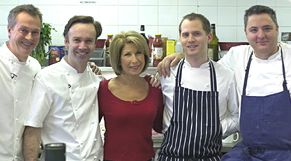 Jennie Bond flanked by series 1 champions Nick Nairn, Marcus Wareing, Bryn Williams and Richard Corrigan
Jennie Bond flanked by series 1 champions Nick Nairn, Marcus Wareing, Bryn Williams and Richard CorriganIn the 2010 series, two chefs - Lisa Allen and Tom Kerridge - chose to cook shellfish dishes despite being allergic to shellfish themselves. Both went on to win their regional heats despite not being able to taste the dishes, with Kerridge's crayfish-and-quail scotch eggs being especially praised by the judges for their originality. Both chefs returned in the 2011 series, and both chose to use shellfish again. In 2012, Kerridge acted as the South West's regional judge, but because of his allergy, Jason Atherton was brought in to assist with tasting the fish and main courses.
The guest(s) of honour at the end of series banquets were -
2006: HRH Queen Elizabeth II (80th Birthday)
2007: The British Ambassador to France
2008: Chefs from around the world, hosted by Heston Blumenthal
2009: British troops returning from Afghanistan
2010: HRH The Prince of Wales and The Duchess of Cornwall
2011: "Community food heroes", hosted by Barbara Windsor
2012: British Olympians, hosted by Sir Steve Redgrave
2013: People associated with the Comic Relief charity
2014: 70th Anniversary of D-Day
2015: Centenary of the Women's Institute
2016: "Great Britons" (marking HRH Queen Elizabeth II's 90th birthday)
2017: 140th Anniversary of Wimbledon
2018: 70th Anniversary of National Health Service
2019: 50th Anniversary of The Beatles recording at Abbey Road Studios
The Queen attended the 2006 banquet in her honour, but not the 2016 event.

